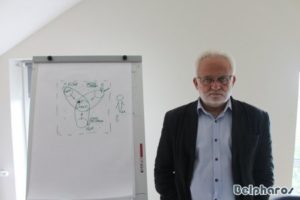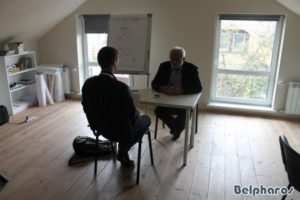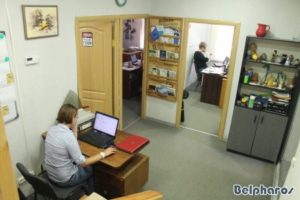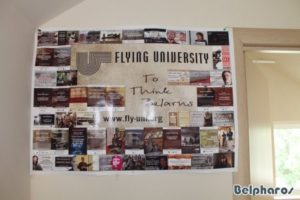Interview with Vladzimir Matskevich
Uladzimir Matskevich is a philosopher, historian, and sociologist, He is active in the social and political field. He is a founder of the Flying University, the only independent university in Belarus
At first, we would like to hear from you about your University. What kind of an institution is it, what does it do?
It is a realisation one of the cultural policy programmes, that we have beenworking on for many years. We are aiming in coming up with bringing to Belarus, what is lacking in our country. Cultural policy includes two triades. One of them is: desovietisation, belarutenisation and europeanisation, the other one, the structural one is: university, party, newspaper. The development of the cadres of the country, the political development. Party is more of a metaphor, it means establishing a political movement in the country. Newspaper is also a working name for all our affairs and activities in our field. University is the main part cultural policy. At first, we wanted to bring up the cultural education. It was when Soros Foundation was present in Belarus. I was one of the experts of the educational council of the Foundation and we attempted to come up with plans for reforms of cultural education. University was a kind of a politeia structure. But then the authorities tried to put pressure on us and afterwards they would simply smite universities. So we thought about establishing our own structures. Many lecturers and professors were dismissed from their jobs, and they were most famous ones, from best universities. The phrase ‘banned profession’ appeared. We invited these people to participate, so they do not fall off the course of life. We proposed them to meet the students, hold lecture, and on this base we established the Flying University. The name is taken from the Poles, who in the end 19th century during the time of harsh russification, would create informal structures, which were then copied during Solidarity times. We liked the name, and so we took it. It has been working for six years now.
Was it difficult to register the University officially?
We have not registered it and we are not going to. There are many reasons. First, we do not really need it, and they will be slow with it. Second, we would then be a subject of several Belarusian laws and rules for the higher education, and we definitely do not want it. When we first started with the Flying University, there were many issues, they tried to put pressure on us, they would try to obstacle us renting space. But again, the name Flying University means, that we are in various places with our lectures. And so two years went by. Then I came to wrestle with the city branch of KGB and I wanted to organise a meeting with those, who pressured us. No opportunity for that was given, but in any event, after this struggle they stopped to force us. Of course, they do watch, track us, but as for now, they still do not disrupt our work.
Do you mainly work with students?
No. At first, Flying University aims in saving and preserving of the cultural potential. That is why we invite people of various backgrounds who cannot find a place in official structures. Students are also eager, because most of them do not like the official system of higher education and that is why they come. They are aware, that we cannot issue them diplomas, we cannot ensure their specialisations. We speak of that honestly, we say „we can only give you what you cannot get in other places”, and they understand. The want it. Plus, our students are not only those studying in other universities, but also lecturers in other universities. People, who have made their careers, they feel good in their life, but there is still some void. Some dreams from the youth maybe, they come for what they did not manage to gain. But there is also elderly people, in their sixties, seventies. We do not say no to anybody.
What do you think of Belarusian students? Are they interested in engaging in political activities?
They are not active at all. Almost all Belarusian students are very passive. There are young people, who want to do something, there are organisation, that do politics to some extent, but on the other hand, when they get involved, they enter the risk group. They can be kicked off the university, then they can go abroad or get involved in the indirect political activity. In any event, they would have lacks in education.
What about those, who are willing to enter politics from the official side?

They would not obviously have any problems with that, but the problem is, that in the official segment there is no politics whatsoever. There is only hierarchy, and yes, one can made career there.
So you understand politics as a dialogue then?
Yes, I understand politics in its classical meaning, in its Aristotelian sense, so it is an art of realising the common goals of the community. It is a dialogue, a participation, a competition. More than struggle for power, it is a struggle for the influence to the decision making process. I do not like to call it politics, what our so-called opposition parties are doing. From elections to elections nobody knows them, nobody hears about them, in every elections they try to go, and then they lose, and that is it. Politics requires advocating common interests, balancing them, being influential and so on.
Speaking of elections, what is your view of the current parliamentary elections?
I promised myself, that I would not comment on them and I would not speak about them, and this is my whole view. There is no elections at all here.
And what do you think about the future of Belarus in, say 10-20 years?
The future will be how we will make it. I am not a fortune-teller or an astrologist to prognose. I do not like it at all and I cannot do it. I only can say, that its political state and the flow of world politics and economy would require including Belarus into the all-Europe orbit. Will it be on purpose, or by accident, it is hard to say, but I the trend is going towards that direction. Important thing is that we do it with knowledge, understanding and qualitications.
Apart from Flying Universtity, do you also work or participate in any organisation?

I was also one of the initiators and founders of the International Euro-Belarus Consortium. I was the head of the council of the Consortium. Only recently I got dismissed. Someone else was chosen, but I still am a members of it. I also initiated and leadered the National Platform of the Eastern Partnership. There are some initiatives I started, and now the Flying University. I am also active in the mass media, I have my programme in Belsat, we also have a website Eurobelarus with many materials.
Do you feel the pressure from the official factor, because you participate in such activities?
As I have spoken before, since the founding of the Flying University I am constantly under observation. Mabe you have heard about that funny episode in spring, when they tried to take me to court for taking part in a demonstration, even despite I was not in Minsk at the time, I was in Warsaw. Of course, I could easily just go to the court and show my passport, but I decided to show how our so-called judicial system works and let them come up with the witnesses that claimed I was purportedly there. Then only I showed my alibi. Oh, well, I am all under the detailed control and observation, but I understand what I am doing and I think what I do here in the Flying University, and as a philosopher in my books, courses, lectures. I understand that simply giving a reason to put me to jail, it would not be good for what I do. I decide to just do my thing, not to ask the authorities for their opinion, not to pay attenton to them. Just I am finding ways to go around. If we think of the future, and how it will be, and we want it to be a normal one, then we have to work.
We have to work here on the spot, in Belarus, That is why I do things in such way.
Do you feel you achieved a lot in what you do?
It is more a question of ones ambitions. What you actually wanted to achieve, and what you did achieve. If we compare to those who wanted to achieve similar goals, we achieved a lot. But if we compare with what we wanted to achieve, then probably it would not be that much. We of course would want to establish a regular full university with the European system, then obviously we would fail. They will stop on after we make the first step. That is why we move from here to there, without registration, with no strings attached. We are creating the society of the University, we already have a students’ society even despite we do not have many perks for students. There is an organistion of students with their attributes and so on. There is a whole lot of lecturers, that openly say, that they can do real work only here, in the Flying University.
Have you thought about moving the University to another place, just the European University of Humanities in Vilnius did?
You see, EUH was established in the period of a certain democratisation with a good patronage. Even Russian Orthodox Church would support it. We do not enjoy such support. That is why, when EUH existed, we would say, that there no need to establish anything new. But then in 2003 EUH was banned from the country and had to move to Vilnius. I don’t think that a university should be emigrating from its own country, and EUH then started to degrade. If it was back here, of course, it would be very much welcome. If EUH was here, we would not need any Flying University. It is all politics. We cannot now make a full university here, so we are doing what we can. Just in the same way – Belarus badly needs an unofficial TV channel. There is of course many Russian channels. And there is Belsat too but it cannot be in Belarus, it is not in Minsk, it is in Warsaw. It is just our reality. Let us see things realistically and not hold some stupid grudges. We can do, what we actually are able to do. If we are doing so, there might be people who say it is too little. I tell them come, join, help. But do not demand impossible, like, for example, to make a full university here, to establish an independent TV channel in Belarus. There cannot be a full university, then let us make the one like ours. We cannot have a TV channel in Minsk, let us make one in Warsaw. it is necessary to seek the gaps and do what is possible, instead of struggle with obstacles and troubles. And, what is more, the biggest obstacle is always lack of money.
What is your understanding of democracy? Would it be possible to establish democracy in Belarus.
I have a book, that is called „Belarusian Democracy”. We can and have to speak of democracy a lot. It is a system, that is very complicated and it is all about social and political relations between all the people. Is it possible in Belarus? Well, and are Belarusians different than Poles? Than Hungarians? Lithuanians? Are we having horns? Tails? We are regular Europeans. How many European nations have gone through certain stage of authoritarianism or totalitarism? Spain. Portugal. Romania. Bulgaria. Poland. Czech Republic. Hungary. Us too we have just stopped a tad, we were a bit late. There is a very strong influence of Russia on us. The regime, authoritarism, dictatorship is founded on the Russian support and Russian weapons and Russian money. Were there no Russian support, we would prevent the attempt of establish the dictatorship already in 1996. Everybody is in awe with Ukrainian Maidan, and our Maidan should have been happened in 1996. Only Russian ingerention it was, that Lukashenko’s impeachment was not performed and we had a coup d’etat. Of course in 1996 we were not ready for such a coup, as it happened in Maidan in 2013. We were not ready, but we were strong enough to prevent dictatorship. And we would make it was there no an intevention from Moscow. Look at the Ukraine. Russian intervened too, but then also Europe with America intervened. They tried to balance the Russian influence. And we were left alone one on one with Russia. More over, one of the main players on the arena of international politics, which is Germany, stands on the point, that Belarus is a Russian sphere of influence. They simply gave us away to the Russians. What do they then want from Belarus? Why would you teach Belarus democracy? We are not worse than anybody else. But the Poles look us down. The Germans handed us in to Russia. And we do what we can, at least that.
You have said, that students are passive. How do you then see the possibility of establishing a civil society in European meaning here in Belarus with such attitude in the young people? It would be a long way to go.

It is a long way indeed. But it broke. We used to have a high level of activity in the end of the 90s. Afterwards there was a fall, Russian ingerention, mass media, etc. And then there was three, four five years, 2010s, until year 2010, which was a big trauma for Belarusians. It is like we are on a hype, then we fall down, hype again, fall again. Our path is very, very difficult to go. Slow and difficult. Students could actually get to be active, they could become the core of NGOs, they could try to incite activities amongst the greater mass of people. But now everything is about registration. It all clashes with the registration issue, especially for these, who decide to register and act in legal frames. All the power is lost to buraucracy and procedures, and this bureacracy is intended to make people, movement to lose their strength to cope with red tape. For people to do empty work for keeping their legal status, instead of working on their mission and goals. And my opinion is, if the authorities want us to register, then let them go on and register us. They also rather not notice our existence, they let us be, okay, at least they do not mess with us and we are good with it. Human activity is always happening in groundbreaking moments of history, such as Solidarity movement in Poland, when 11 000 000 people were members, even though not of them were active members. Then let us look at Czechoslovakia, where the Charter 77 comprises just a few tens of intellectuals and the result was similar. It is because when the actual momentum came, people just went out to the streets everywhere. Then in 1991, later than Eastern Europe, it happened here. Everything will be all right, if only one helps properly, not disturbs. And when we speak straight, seriously, there is a lot of grudge towards European foundations and structures that try to help us. They do not really know too much about our reality, they do not have good orienteering in our country. They usually do more harm. For example – as for the registration, there are many government, that give the foundations from their countries a possibility to come to Belarus. But they require a foundation would register and work with the locals. All right, do come, do put money here. But then, it goes through the govermnent and nobody knows that what you are doing is done with your money. People think it is done by Belarusian government. So these Europeans do not have the PR, no results, they do not raise their supporters and structures which would continue the activity work. I do not even want to speak about some American foundations, that actually are so wrong in their outlook of the situation, that they support enemies of democracy, people who are government’s proxies.
What do you think of Belarusian Republican Students’ Union, the official students’ organisation.
And what should I think? It is not an organisation. It is a governmental institute.
The last question is: When will you be able to say „I have finished my work”?
Hm. Maybe in 300 years. I am in cultural politics, it is a long way to go. Of course, I will not live for 300 years, so I have to give this heritage to people who would come after me, and this is my job. They are my students, my colleagues, I try to stimulate them to take the ideas of cultural politics and I delegate them tasks and teach them to be independent.